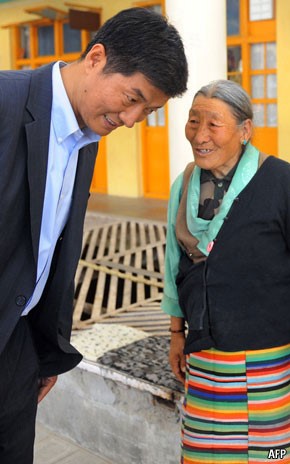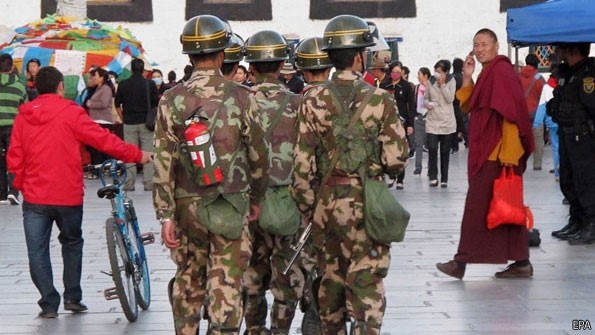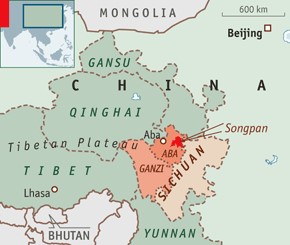 
 字體:小 中 大
字體:小 中 大 |
|
|
|
| 2018/03/03 23:06:40瀏覽18|回應0|推薦0 | |
China and Tibet Go back to law school An elected leader is the last Tibetan China wants to talk to May 19th 2011 | from the print edition
AS CHINA gears up to celebrate the 60th anniversary of its annexation of Tibet, it has issued a stinging rebuff to the newly elected prime minister of the Tibetan government-in-exile, Lobsang Sangay. The winner of an election among Tibetans outside China, Mr Sangay will have a higher profile than his predecessors, because the Dalai Lama, Tibet’s spiritual leader and international figurehead, has said he will withdraw from his political role. So Mr Sangay, a 43-year-old fellow at Harvard Law School, has been visiting his electorate, most of whom are in India, and discussing his plans. He offered to negotiate with China “anytime, anywhere”. China responded through an interview in an official magazine, China’s Tibet, with Zhu Weiqun, a frequent Communist Party spokesman on Tibet. Mr Zhu’s contempt at “that government-in-exile of his” almost splutters off the page: “It’s all just a separatist political clique that betrays the motherland, with no legitimacy at all and absolutely no status to engage in dialogue with the representatives of the central government.” Related topics So the Dalai Lama’s decision to democratise his government-in-exile seems to have made reconciliation with China even less likely. At least, under the old dispensation, a series of fruitless talks between China and Tibetan exiles had lurched ahead every few months since 2002, usually breaking down in acrimony. Even that now seems too much to hope for. Yet Robert Barnett, a Tibet expert at Columbia University in New York, points out that there is nothing new in China’s rejection of Mr Sangay’s overture. It has never had any truck with the government-in-exile. The Tibetan side in the talks has always been filled by the Dalai Lama’s representatives. That practice can still continue. Indeed, the Tibetan exile parliament, discussing a new constitution, last month approved a draft asking the Dalai Lama and his successors, despite his retirement, to “speak on behalf of the Tibetan people, to explain and discuss their concerns and needs as well as to appoint representatives and envoys to serve the interests of the Tibetan people in any part of the world.” By distancing himself from the exile government, the Dalai Lama has in effect met a Chinese demand. China could, if it chose, regard it as a concession. It could also look that way on the Dalai Lama’s resignation statement in March, in which he said that two pro-independence “political promulgations” he had made in the past would become “ineffective”. The Dalai Lama has long given up the demand for independence in favour of enhanced autonomy under Chinese sovereignty. China has always presented this as a tactical ruse. China seems to hope that with the passing of this Dalai Lama, Tibetans, deprived of a leader with superstar status and following, will give up the struggle. He seems in good health, but is now 75. So it may have been alarmed by the Dalai Lama’s remark at a press conference in New Jersey, America, this month, that Tibetans are close to “finalising” the process for finding his successor, that is, his reincarnation as the 15th Dalai Lama. He said that all the schools of Tibetan Buddhism are involved in this. This unity among the various schools would be unprecedented—and important, since it seems quite likely that the next incarnation of the Dalai Lama will be contested, with one candidate backed by China and one, probably in exile, revered by most Tibetans. The Dalai Lama appears to retain the loyalty of most Tibetans inside China, too. The focus of Tibetan resistance since March has been around the Kirti monastery in an area of Sichuan province that Tibetans regard as Amdo, part of historic Tibet. Protests that started with the self-immolation of a young monk have seen hundreds of monks detained, two elderly laypeople killed trying to protect them, a continuing heavy security presence in the area, and the burning of books not approved by the authorities. So, as it celebrates, on May 23rd, the 60th anniversary of the “17-point agreement” in which a young Dalai Lama agreed to accept Chinese sovereignty over Tibet, China knows there is no immediate threat to its rule, but that many Tibetans still resent it. Still, it is, for China, a peculiar document to commemorate. The Tibet it envisages—under Chinese sovereignty but autonomous—seems closer to the Dalai Lama’s demands than to present arrangements. China promised not to alter “the existing political system in Tibet”, a promise swept aside in 1959 as it crushed a Tibetan rebellion and the Dalai Lama and 80,000 followers fled into exile. In 1951 the political system was a feudal theocracy. Now that exiles enjoy the forms of parliamentary democracy, they find China no more trustworthy. China, in turn, finds the exiles’ political system no more appealing. from the print edition | Asia ==== Go back to law school May 21st 2011, 18:02
With more and more Han People moving into Tibet and time going by, Tibetan exile government is difficult to go back to Lhasa, or try to establish a country. But this exile government is now owning his full-democracy election, owning their higher autonomy outside Beijing’s China. According to some standards whether this is a country, I say “this is a non-territory country” and feel depressed and unhappy about Beijing’s chicken attitude. Chinese Communist Party has been governing Tibet for more than 50 years. From the time when Dalai Lama 14th won the Nobel Peace Prize, rumor had it that he would like to choose his next political leader through democractic election. In my opinion, Dalai Lama never wants to come back to Tibet and still conflict with Beijing although he uses some rhetoric sentences to talk about his so-called political structure under Chinese Constitution (I don’t know whether what he said is our Beijing 2004 constitution).
But Lobsang Sangay who graduated from New Dehli University and got doctor degree in Harvard University is one of new generation. He also once joined some forums for several times in nearly ten years. By democratic logic, his succession of this government can represent 6 million exiled Tibetan. He is not the self-regarded Dalai Lama who only say religious words and cannot offer any constructive plan negotiating with Beijing. Chinese Communist Party is reluctant to see this elections, but I can see some talks starting in the nearly future between the exiled government and Beijing. I think he will play the more important role in discussing the combination between these 6 million people and the 1.3 billion native Chinese; meanwhile, I suggest Mr. Sangay that he could rethink this exiled government’s internal rule whether to amend in order to accord with Beijing’s constitution. Although Mr. Sangay shows the more democratic model than mentally-retarded Ma Ying-Jaou, or the incumbent Chinese President Hu Jing-Tao, this exiled governments cannot own the soverignty of Tibet. Anyway, in forseeable years, Tibet is still one of the Beijing’s Chinese Member.
Recommended 4 Report Permalink Go back to law school May 22nd 2011, 03:12
To PL123:
Lobsang Sangay don’t need to learn Chinese but if he can speak English, of course he has ability to talk with Beijing and can press some documents to international media, just as I can post these articles on this magazine.
Second, the “democracy” does not represent “soverignty”, and don’t link any word to any you want too quickly. Basically speaking, for Chinese Communist Party this election is surely a illegal and rude action, but instead of Dalai Lama 14th, Mr. Sangay may be a “pure” political figure and a well-educated scholar. Under this new situation, we can guess Beijing shows more willingness peacefully to talk with Mr. Sangay rather than Dalai Lama 14th (Beijing has been seeing Dalai Lama 14th as a “pure” religious figure and for this reason, any Dalai Lama 14th said is only junk).
By the way, you seem to defend Beijing central government, saying any sentence this exile government say is invalid and cannot be used as any testimony. You have many trouble the same as Chen Yun-Lin, Hu Jing-Tao’s silly dog. If you say these words again, or try to use “illegal” logic to let Beijing get no touch with these exiled Tibetan, the situation is getting worse than ever before and not accords with the thought Beijing wants these exiled Tibetan to come home (although Beijing still use military force and diplomatic way to deter the expansion of exile government, just as People’s Liberation Army aims at Taiwan island by “missle’s on” anywhere and one day would get it). Don’t be cheated by the only outer layer.
Recommended 9 Report Permalink
這篇是原回文區連結https://www.economist.com/user/2791934/comments 的第22頁頂處,附第21頁的回文一篇。Sangay的當選雖然沒有帶來新局,但是政教沒有合一的西藏流亡當局會有現代化的組織演化傾向。藏胞有六百萬多仍然長年流亡海外,這兩篇措辭還是很強硬,但是筆者回說因為是世俗人士的繼位,而且是經過直選產生已非宗教或貴族任命。不過是到了去年11月在昆明才有了一次接觸談判。可見在此附近的當局組織內的社會階級應也起了很大變化。這篇之後有聽過一歸納,為10個人次點讚後算不錯的貼文鼓礪。曾經後來加強了一些用字,如testimony, under situation, 以及使用democracy來看主權的問題恰當否作了檢討。這篇有人問過筆者,雖說還不錯,但是仍然需要多讀一點附近學問來回會比較適合呵。 (2018,08,06)附一篇2011年11月12日報導中國政府處理西藏騷動的方式 China’s restive Tibetan regionsNo mercySelf-immolations continue, as do the Communist Party’s hardline policiesNov 12th 2011 | SONGPAN | from the print edition
“THEY are suffering. They have no rights”, says a red-robed monk of his fellow Tibetan Buddhists on the other side of a snow-topped mountain in Sichuan province, in south-west China. His small monastery in Songpan county has so far been spared the worst of an intense security clampdown in Tibetan areas of Sichuan, following a series of self-immolations by Tibetan protesters, most of them monks and nuns. China calls them terrorists, and fears the suicides could spark renewed unrest across the vast plateau. Over three years ago Tibet and Tibetan-inhabited parts of Sichuan, Qinghai, Gansu and Yunnan were engulfed by the biggest wave of anti-Chinese unrest in decades. Today it is in Sichuan’s highlands that the authorities appear to be struggling most to contain simmering discontent among ethnic Tibetans. Sichuan’s two “autonomous prefectures” with large Tibetan populations are Aba (Ngawa in Tibetan) and Ganzi (Kardze), whose combined area is almost the size of Great Britain. Much of the area was once part of the famously warlike traditional Tibetan region of Kham. In 1991, China’s then Communist Party chief, Jiang Zemin, said that “to keep Tibet stable, it is first necessary to pacify Kham”. That attitude is an ancient one among China’s rulers, and still applies. In this section · »No mercy
The authorities have been trying to keep foreign journalists out of the worst-affected areas of Aba and Ganzi. They are nervous that news of the immolations and the grievances that led to them will inflame tensions among more than 1m Tibetans in the two prefectures. (The population in Tibet proper is three times larger.) The handful of journalists who have ventured beyond Songpan this year have been briskly caught and turned back. The police have recently been helped by snowfall on the mountain road from Songpan to Aba town, which is at around 3,200 metres (10,500 feet) above sea level. Officials have reason to be fearful. For Tibetans, self-immolation is a new form of protest. Such acts are difficult for the authorities to prevent, and images of them can have a powerful psychological effect among sympathisers. Eleven Tibetans have tried to kill themselves this way since March. Six have succeeded, the latest a 35-year-old nun in Ganzi on November 3rd. On October 19th Tibet’s exiled spiritual leader, the Dalai Lama, held a prayer ceremony for the dead in Dharamsala, the Indian town where he now lives in exile. China’s foreign ministry accused him of inciting “terrorism in disguise”. Fire extinguishers have become the accoutrement of choice for police patrols (see picture) as far away as Lhasa, the Tibetan capital some 1,200km south-west of Songpan. The anger and desperation that has prompted Tibetans to set fire to themselves is common across the plateau. In all of China’s Tibetan-inhabited areas, the authorities have rounded up innumerable monks, nuns and laypeople for taking part in the 2008 unrest. Reports of torture are rife. Many monks have been forced to denounce the Dalai Lama, who even in Songpan, where things are relatively calm, is deeply revered by Tibetans. This correspondent was often asked for news of him. “You can’t call yourself a monk unless you support the Dalai Lama”, says a Songpan resident. But Aba and Ganzi share an additional layer of resentment. Both prefectures saw the only well-documented cases of police firing on demonstrators in 2008 (20-30 people may have been shot dead in Aba town). Unlike Songpan county, where monasteries are small and scattered, Aba’s main monastery, called Kirti, is large and central. Monks at Kirti have been particularly prominent in the prefecture’s unrest, and the monastery is now under heavy police guard. Woeser, a Tibetan blogger in Beijing who closely monitors the region, says the authorities inadvertently exacerbated Sichuan’s instability by expelling hundreds of visiting monks from monasteries around Lhasa after the 2008 unrest. Many of these monks were from Sichuan, and they returned to their monasteries with tales of Lhasa’s upheaval and the recriminations that followed. Others, barred from their original monasteries, became wandering malcontents. In Ganzi, Woeser says, passions have been stoked by the hardline fulminations of the prefecture’s ethnic-Han party chief, Liu Daoping. (Aba has a Han party secretary too, as, invariably, does Tibet itself.) The authorities have tried to intimidate Sichuan’s Tibetans into giving up their protests by imposing heavy sentences on monks accused of involvement in the immolations. Free Tibet, a London-based NGO, says six have been jailed so far. Whose side the judiciary is on is clear from the title bestowed on Songpan’s county court: “Advanced Collective Engaged in the Task of Opposing Separatism and Preserving Stability”. Not much subtlety or accommodation there. Sichuan’s restive monks can expect no mercy. from the print edition | Asia · 12
|
|
| ( 心情隨筆|心情日記 ) |












